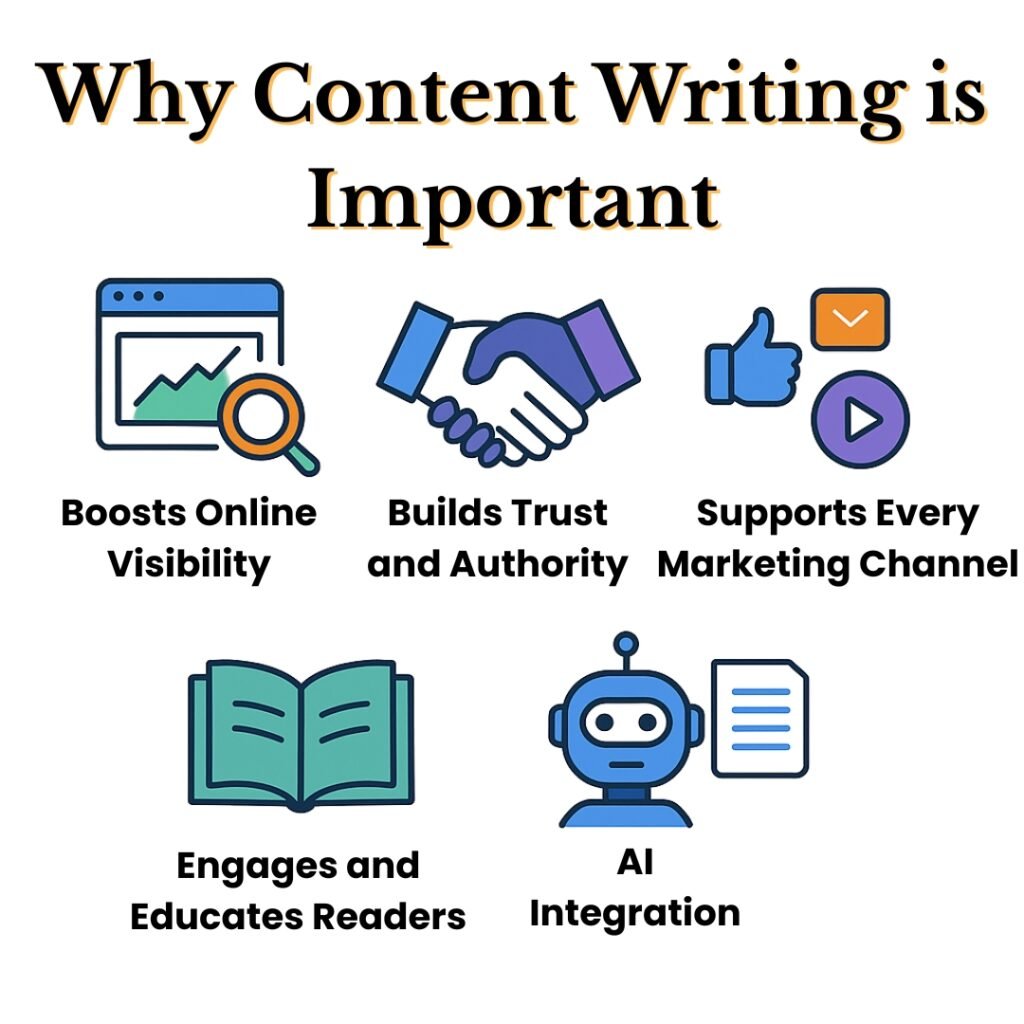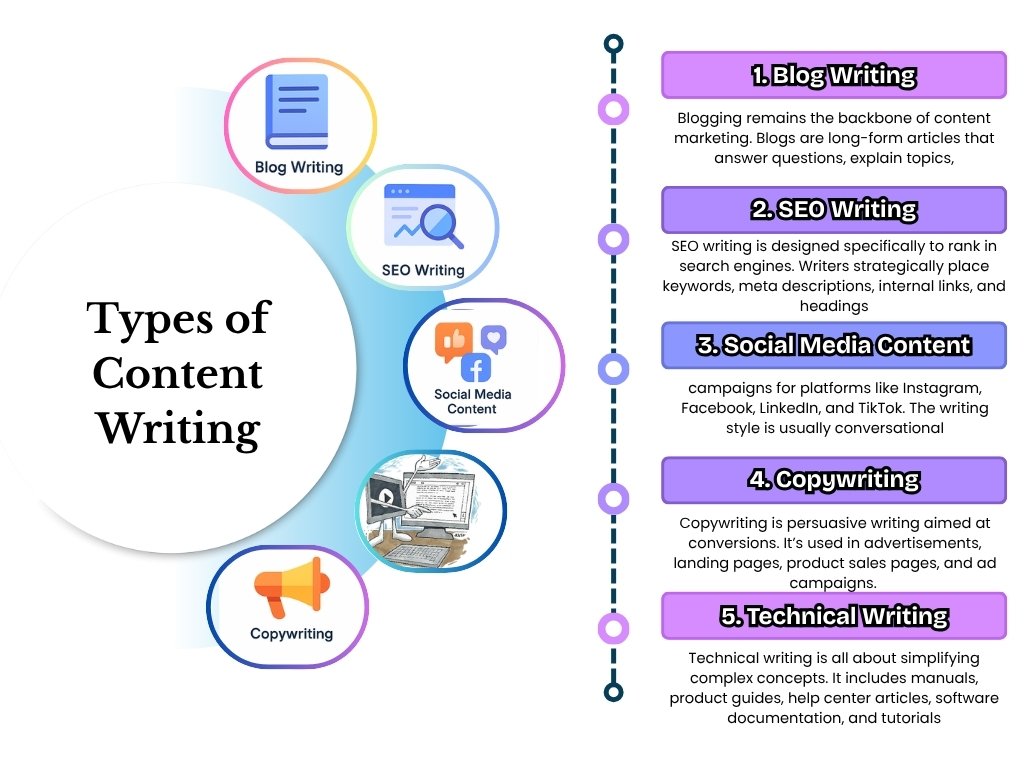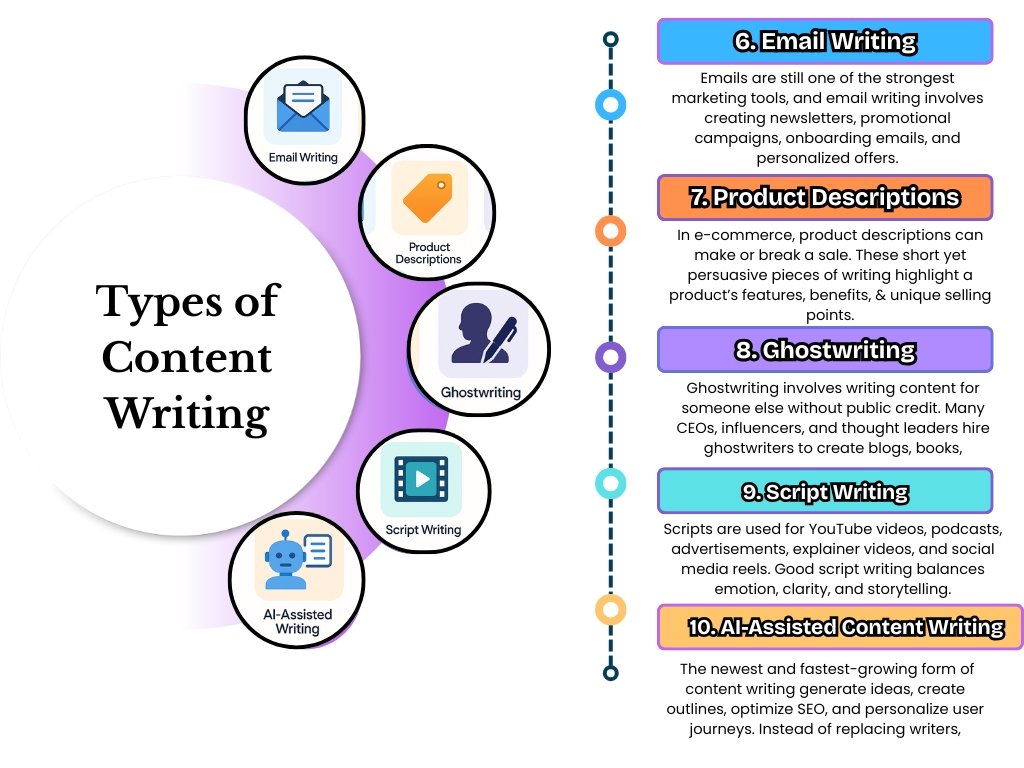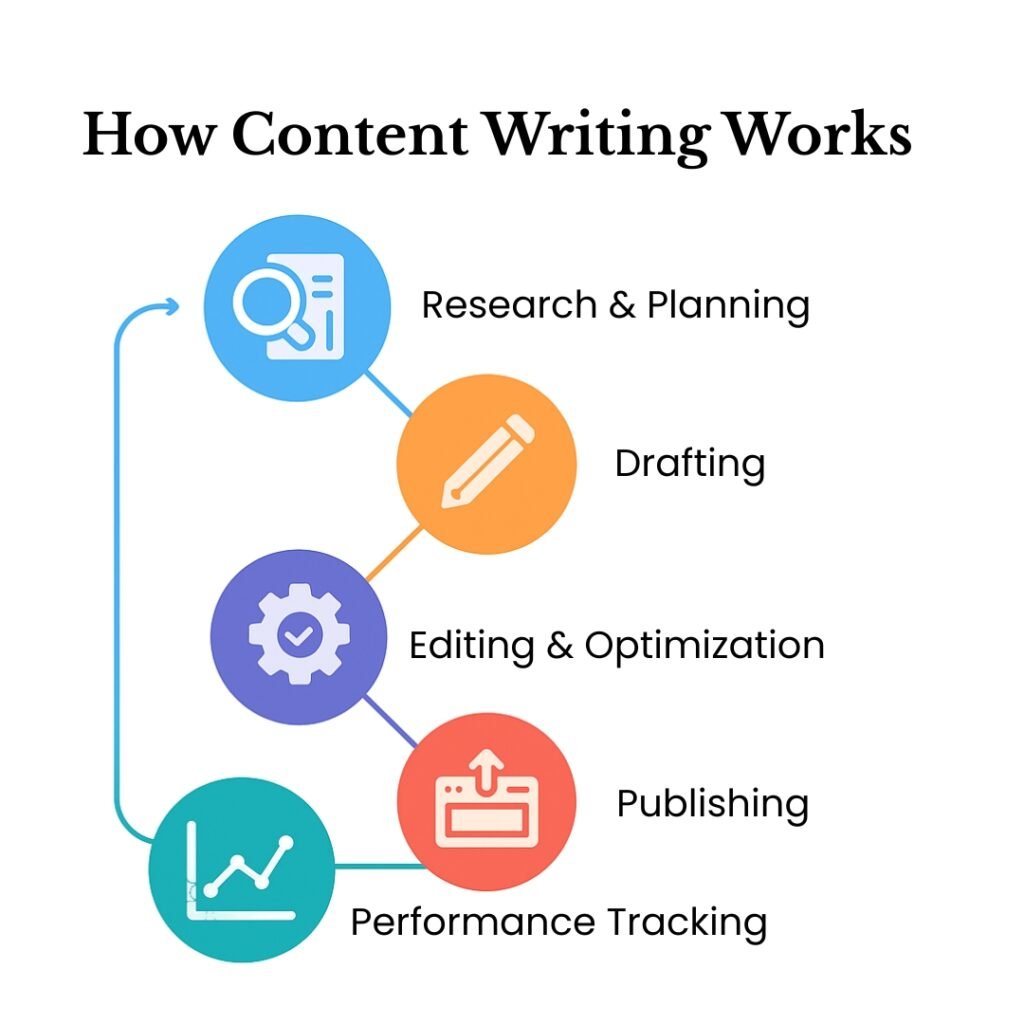Content Writing - The Ultimate Guide
Content writing in 2025 has become one of the most powerful tools in digital marketing. It helps brands attract, engage, and convert readers by delivering valuable, high-quality content across multiple platforms. Today, successful content writing blends creativity, storytelling, and SEO strategy, supported by AI tools and new technologies, to achieve meaningful business results.
What is Content Writing?
Content writing is the art and practice of creating written material that informs, educates, and inspires an audience. It can include blogs, articles, product descriptions, website content, social media posts, ad copies, newsletters, scripts, and more. The primary goal of content writing is to build trust, enhance credibility, and drive readers to take specific actions—whether that’s subscribing to a newsletter, purchasing a product, signing up for a course, or simply engaging with a brand. content writing has gone far beyond just writing words. It now integrates AI-assisted research, voice optimization for smart devices, multimedia elements like videos and infographics, and personalized storytelling to improve user experiences across digital channels.
Why Content Writing is Essential
- Boosts Online Visibility: SEO-optimized content ensures businesses rank higher on Google and other search engines, increasing brand reach.
- Builds Trust and Authority: Well-researched, valuable writing positions a brand as a reliable expert in its niche.
- Supports Every Marketing Channel: Content powers social media, video scripts, email marketing, and even paid ads, maintaining a unified brand voice everywhere.
- Engages and Educates Readers: Good writing captures attention, provides value, and builds long-term relationships with audiences.
- AI Integration: In 2025, AI is no longer optional—it assists writers with keyword research, performance tracking, personalization, and content creation at scale.

Types of Content Writing in 2025
Unlike a decade ago, when content writing mostly meant blogging, today it’s a diverse field that caters to different business needs. Let’s dive into the major types of content writing and their significance in 2025:
1. Blog Writing
Blogging remains the backbone of content marketing. Blogs are long-form articles that answer questions, explain topics, or provide valuable insights. Businesses use blogs to attract organic traffic from Google, build authority in their industry, and educate potential customers. For example, a travel company might publish blogs on “Top 10 Budget Destinations in 2025” or “How to Plan a Road Trip Across the US.” Consistency in blogging helps brands stay relevant and visible online.

2. SEOWriting
SEO writing is designed specifically to rank in search engines. Writers strategically place keywords, meta descriptions, internal links, and headings without compromising readability. In 2025, SEO content is more about solving user intent than just keyword stuffing. This means writers must blend informative content with the right structure so search engines and readers both find it valuable.
3. Social Media Content
It includes captions, stories, tweets (X posts), reels, & creative campaigns for platforms like Instagram, Facebook, LinkedIn, & TikTok. The writing style is usually conversational and crafted to spark interaction—through questions, polls, hashtags, & call-to-actions. In 2025, trends like short-form videos & carousel posts make copywriting for social platforms more dynamic than ever.
4. Copy Writing
Copywriting is persuasive writing aimed at conversions. It’s used in advertisements, landing pages, product sales pages, and ad campaigns. The goal is simple: convince the reader to take immediate action, such as “Buy Now,” “Sign Up Today,” or “Book Your Free Demo.” Effective copywriting combines psychology, storytelling, and creativity to increase sales and ROI.
5. TechnicalWriting
Technical writing is all about simplifying complex concepts. It includes manuals, product guides, help center articles, software documentation, and tutorials. With more industries shifting towards AI, robotics, and advanced tech in 2025, technical writers play a vital role in bridging the gap between advanced systems and end-users.
6. Email Writing
Emails are still one of the strongest marketing tools, and email writing involves creating newsletters, promotional campaigns, onboarding emails, and personalized offers. A well-written email keeps customers engaged, nurtures relationships, and encourages conversions. In 2025, personalization powered by AI has made email writing even more effective, with brands sending tailored content to specific user segments.

7. Product Descriptions
In e-commerce, product descriptions can make or break a sale. These short yet persuasive pieces of writing highlight a product’s features, benefits, and unique selling points. In 2025, with the growth of AR/VR shopping, descriptions often include interactive and storytelling elements to help buyers visualize products better.
8. Ghost Writing
Ghostwriting involves writing content for someone else without public credit. Many CEOs, influencers, and thought leaders hire ghostwriters to create blogs, books, or LinkedIn articles under their name. This helps busy professionals maintain an active presence and build authority while leaving the writing to experts.
9. Script Writing
Scripts are used for YouTube videos, podcasts, advertisements, explainer videos, and social media reels. Good script writing balances emotion, clarity, and storytelling. In 2025, with video dominating the internet, scriptwriters are in high demand to help brands connect visually and emotionally with audiences.
10. AI-Assisted ContentWriting
The newest and fastest-growing form of content writing is AI-assisted writing. Tools like ChatGPT, Jasper, and other AI software are used to generate ideas, create outlines, optimize SEO, and personalize user journeys. Instead of replacing writers, AI acts as a co-pilot, saving time and allowing human writers to focus on creativity and strategy.
How Content Writing Works

Content writing is not just about writing words—it’s a structured process that ensures every piece serves a purpose. Here’s how it typically works:
- Research & Planning: Writers study the target audience, competitors, and trending topics to decide what to write.
- Drafting: They craft the content, making sure it is informative, engaging, and aligned with the brand’s voice.
- Editing & Optimization: The draft is refined for clarity, grammar, tone, and SEO elements like keywords, headings, and meta tags.
- Publishing: Once finalized, the content is published on websites, blogs, or shared across social media.
- Performance Tracking: Analytics tools measure how the content performs in terms of views, shares, conversions, and engagement. Based on results, future strategies are refined.
What’s New in Content Writing for 2025
The digital landscape evolves constantly, and content writing is adapting fast. Some key trends shaping 2025 include:
AI-Powered Research: Writers rely on AI for real-time keyword analysis, topic generation, and performance insights.
Voice Search Optimization: Content is increasingly written in conversational tones to cater to voice queries from Alexa, Siri, and Google Assistant.
Interactive Storytelling: Blogs and articles now feature infographics, polls, videos, and animations to make content more engaging.
Personalized Narratives: Brands use data to deliver personalized experiences, tailoring messages to specific demographics or even individuals.
Multilingual & Localized Content: With growing global audiences, brands invest in regional-language content to connect with local markets.
Conclusion
In 2025, content writing is more than just a marketing tool—it is the foundation of digital success. From blogs and SEO articles to social media posts and video scripts, well-crafted content is what connects brands to audiences. The combination of creativity, strategy, and AI technology ensures that content continues to be the most powerful way to educate, influence, and inspire readers.
Whether you’re building a personal blog, launching an e-commerce brand, or maintaining a strong digital presence, high-quality, consistent, and innovative content writing is the key to growth and credibility in today’s competitive online world.
